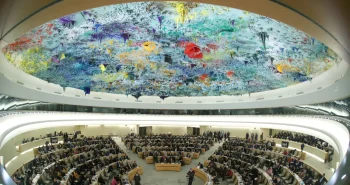During this morning’s discussion on Item 4: “Human Rights Situations that Require the Council’s Attention,” the Czech Republic speaking for the European Union, Canada, the Netherlands, the United Kingdom, Switzerland, Germany, Japan, and Argentina took the opportunity to raise human rights issues from around the world. Country situations addressed included Burma (Myanmar), Sudan, Sri Lanka, Kenya, Iran, China, Zimbabwe, the Congo, North Korea, Saudi Arabia, Pakistan, and Somalia. Iran was especially attacked for executing juveniles and persecuting the Baha’is. A number of states called on the current regime in Burma to release political prisoners, with explicit mention of Aung San Suu Kyi by the EU, the Netherlands, and Switzerland. Sexual violence in the Congo and Sudan was also highlighted.
The President of the Human Rights Council asked that Burma be referred to by its official UN name: Myanmar.
Cuba, on the other hand, tried to change the focus of discussion entirely, lashing out at the very notion of criticizing countries (excluding the U.S. and Israel, of course). “Whoever concocted the idea that item 4 is only to be devoted to dealing with country situations?” it asked. “Why should we continue the narrow approach of former item 9 of the discredited Human Rights Commission whose double standards we remember and deplore. There are international human rights problems that do not enjoy attention from the Council.”
In a classic example of a human rights violating country attempting to detract attention from civil and political rights by drawing attention to nebulous, purported violations of social and economic rights, Cuba demanded the Council focus on the “world crisis caused by the combined effects of the economic, food, and environmental crises.” It went on to note that “underdevelopment is becoming a structural problem while countries of the rich and industrialized North continue to prioritize bailing out banks.” It provided no suggestions of how exactly to address these complex issues, for which there are neither simple solutions nor clear blame to be attributed to developed countries. Cuba also drew attention to the “crisis in ethics and principles undermining respect for universal justice shared by all,” pointing to “problems which scandalize the world, such as secret jails, abduction of humans, and the existence of real concentration camps, such as in Guantanamo Bay and Abu Ghraib.”





